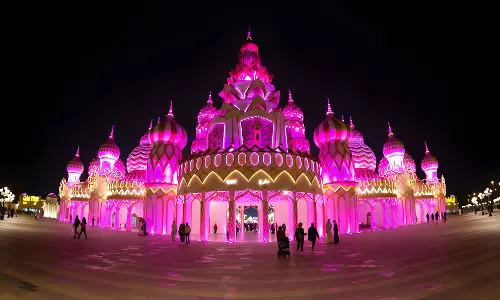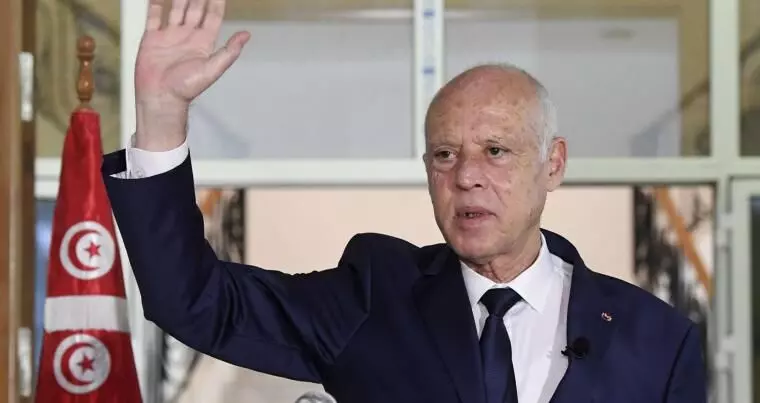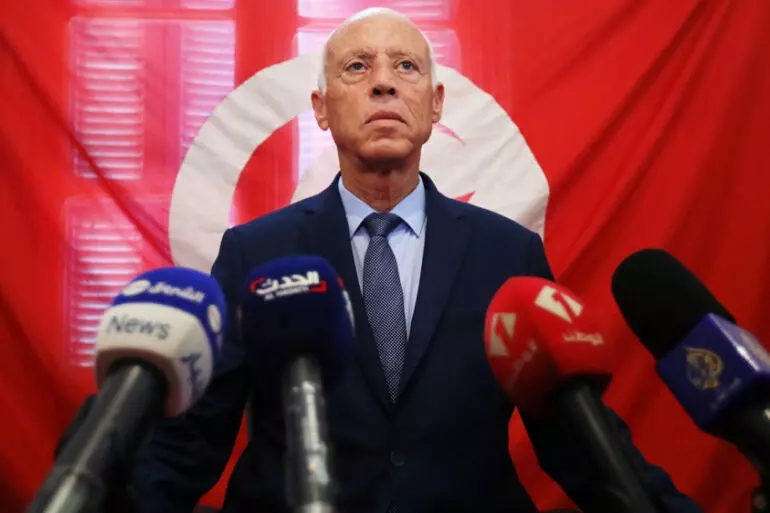
Tunisians vote on new constitution giving President more powers
text_fieldsPresident Kais
Saied of Tunisia (file photo)
Tunis: Tunisia, the north African nation which became the cradle of the Arab Spring revolution in the Middle East and triggered a domino effect of popular uprisings in the region, is going to the polls for a somewhat paradoxical choice: the country's voters till vote on Monday on a new constitution, a controversial move promoted by Tunisian President Kais Saied that critics say will formalise his power grab and reverse hard-won democratic gains in the country.
Monday's referendum marks one year to the day that Saied froze Tunisia's parliament and dismissed his government, in a move widely derided by critics as 'a coup' but celebrated by Tunisians who consoled themselves on the feeling that they were better off than with the country's political elites and decades of economic stagnation.
In the year since then, Saied armed himself with the power to rule by decree and has fired dozens of judges through decisions that have provoked a series of protests.
The new constitution under referendum contains provisions with the office of the president being given all executive powers and removes key checks and balances. The package also will trim considerably the power of Tunisia's judiciary and parliament.
Critics see Saied's new political structure as a modified form of a autocracy in the country. Tunisia was the country that rose up against former autocratic strongman Zine El Abidine Ben Ali in 2011 and kicked off the Arab Spring pro-democracy protests. Although other countries that rose in revolt against autocratic rulers and succeeded initially in establishing of a modicum of democratic order, such as Egypt, Tunisia stood out like an island with a running democracy and elections. However, the current President virtually took a reverse turn in phases inviting the ire of political leaders within and without.
Saied says the changes are needed to eliminate corruption and 'return the nation to the revolutionary path'. The drafting and organization of Monday's referendum has been marred by controversy.
Sadok Belaid, a constitutional law professor whom Saied brought in to head the committee to draft the new constitution, has denounced the result which was extensively revised by the president citing that it contains considerable risks and shortcomings that could pave the way for "a disgraceful dictatorial regime.
Saied has urged Tunisians to back the proposal, despite electoral standards requiring that he remain neutral. The vote will be supervised by the Independent High Authority for Elections, whose members again were appointed by him.
A former constitutional law professor, Saied ran for the presidency on a populist, anti-corruption platform in 2019, winning with over 70 per cent of the votes in the second round.
Supporters of Saied believe the new constitution will put an end to years of political deadlock.
Fatma Ben Salah, a pro-Saied civil society activist, says it's abnormal that the 2014 constitution grants limited powers to a president elected with a large majority but gives more power to the prime minister.
Ben Salah says Tunisia became ungovernable due to years of conflict between the three branches of government, accentuating the country's economic and social crisis.
But for Tunisian magistrate Ahmed Souab, the constitution represents a serious danger for democracy because it does not guarantee a clear balance of powers and gives more prerogatives to Saied than those held by previous Tunisian strongmen.
Numerous civil society groups have rejected the new constitution. The Tunisian non-governmental group Al Bawsala says the new constitution would lead to a monopolitization of power that would threaten every citizen's rights and freedoms.
"(This) does not provide any control mechanism, even in the event of a flagrant violation of the constitution by the president," Al Bawsala communications officer Haythem Benzid told The Associated Press.
But the spectrum of political Opposition in Tunisia falls short of being united in its opposition. Only one party, Afek Tounes, has said it will vote against the proposal. Most political parties, including Tunisia's influential Islamist party Ennahdha, say they plan to boycott Monday's referendum so as not to legitimize the process.
"We refuse to go to the funeral of democracy," said Republican Party leader Issam Chebbi, adding that he considers "the absolute personal power" that Saied wants to grant himself is worse than that of Ben Ali.
Tunisian activist Henda Fellah tweeted Sunday that she had decided to boycott the vote, saying the text is built on a flawed foundation and that its violations of electoral law were countless. This would be the first time I'm not voting since 2011, Fellah said.
That said, observers expect low voter turnout for the referendum, highlighting Tunisians' disenchantment with politics and their daily struggles coping with rising inflation.
The preliminary results are expected to be announced by Wednesday, with a final result on August 28.
(Based on PTI feed with minor edits)



























